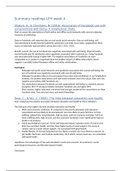Summary readings LFH week 4
Shakya, H., & Christakis, N. (2016). Association of Facebook use with
compromised well-being: A longitudinal study.
Goal: to assess the associations of both online and offline social networks with several subjective
measures of well-being.
Data on Facebook: self-reported data on real-world social networks. Data on well-being: self-
reported physical health/mental health/life satisfaction and body mass index. Longitudinal: three
waves of nationally representative survey data (2013, 2014, 2015).
Results: overall, the use of Facebook was negatively associated with well-being. Physical health,
mental health and life satisfaction were negatively associated with Facebook use. Using Facebook
was associated with having a higher BMI. The negative associations of Facebook use were
comparable to or greater in magnitude than the positive impact of offline interactions, which
suggests a possible tradeoff between offline and online relationships.
Conclusion
- Although real-world social networks were positively associated with overall well-being, the
use of Facebook was negatively associated with overall well-being.
- Although the positive effects of social support have been well-established, in our longitudinal
analyses, the positive associations with real-world networks were less robust than were the
negative associations with Facebook use.
- The associations between Facebook use and compromised well-being is a dynamic process.
- Exception: BMI strong correlation between Facebook use and higher BMI.
- More women, higher educated, unmarried and younger people let the researchers use their
Facebook data. They also had more real-world friendships.
Ross, C., & Wu, C. (1995). The links between education and health.
Goal: explaining the positive association between education and health by three indicators.
The indicators that explain the links between education and health:
1. Work and economic conditions compared to the poorly educated, well educated
respondents are less likely to be unemployed, are more likely to work full-time, to have
fulfilling, subjectively rewarding jobs, high incomes, and low economic hardship. Full-time
work, fulfilling work, high income, and low economic hardship in turn significantly improve
health in all analyses.
2. Social-psychological resources the well educated report a greater sense of control over
their lives and their health, and they have higher levels of social support. The sense of
control, and to a lesser extent support, are associated with good health.
3. Health lifestyle the well educated are less likely to smoke, are more likely to exercise, to
get health check-ups, and to drink moderately, all of which, except check-ups, are associated
with good health.
Hypothesis: the advantages of the well educated in work and economic circumstances, social-
psychological resources, and lifestyle improve health.
Conclusion:




